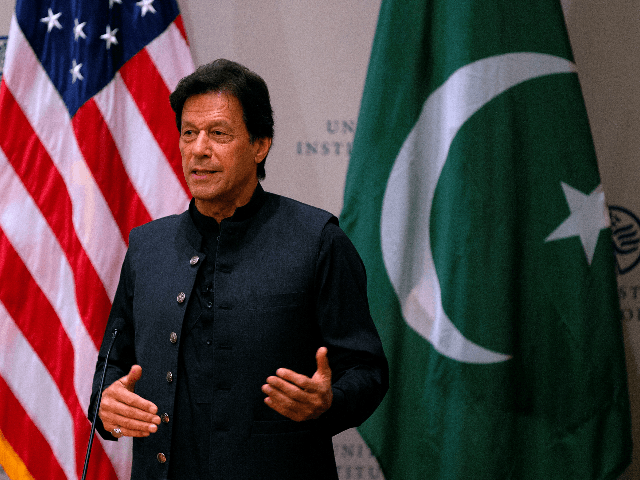Pakistani Prime Minister Imran Khan on Monday suggested that the Taliban should play a role in Afghanistan’s political process after a peace agreement is reached, a move that could allow the narco-jihadi group to return to office in Kabul after U.S. forces removed its regime from power in late 2001 for harboring the 9/11 perpetrator al-Qaeda.
Echoing the position of its ally China, which also borders Afghanistan, Khan declared during an interview with Fox News’ Bret Baier that aired on Monday:
People in Afghanistan have suffered four decades of conflict. The last thing Afghanistan needs is more violence and it needs peace. The Taliban should become a part of the political process, so then you would have a government which will represent the people of Afghanistan.
In January, Yao Jin, the Chinese ambassador to Islamabad, proclaimed that the Taliban is a “political force” that must be allowed to “play a legitimate role” in a negotiated political settlement to end the war in Afghanistan.
According to the latest assessment, the Taliban controls or contests about half of Afghanistan, more land than during any other time since U.S. troops removed its regime from office in late 2001.
Khan’s suggestion that the Taliban is allowed to participate in Afghan politics is consistent with U.S. President Donald Trump’s policy of making the “political reconciliation” between the Taliban and Kabul the primary tenet of its strategy to end the war.
Conceding that a U.S. military victory is unattainable in Afghanistan, Trump administration officials have expressed support of Kabul’s unconditional offer to the Taliban of a ceasefire and legitimacy as a political group.
The Taliban has rejected the offer, claiming it will only engage with Kabul after the full withdrawal of foreign forces.
Marking a departure from its predecessors, the Trump administration has held eight rounds of direct talks with the Taliban over the last year.
Negotiators are mainly working out the details of a draft agreement to pull foreign troops out in exchange for counterterrorism promises by the Taliban, a truce with Kabul, and pledge to negotiate directly with the Afghan government. The Taliban has allegedly agreed to prevent international terrorist groups like al-Qaeda and the Islamic State (ISIS/ISIL) from operating in Afghanistan.
United Nation officials believe the Taliban remains cozy with its al-Qaeda allies nearly 18 years after the start of the U.S.-led war in Afghanistan against the two groups.
Taliban terrorists have also capitalized on the peace negotiations to intensify attacks against U.S.-backed Afghan security forces and civilians.
Pentagon officials have long accused Pakistan of harboring terrorist groups killing and maiming U.S. troops and their allies in Afghanistan.
U.S. President Donald Trump’s administration continues to withhold hundreds of millions in American aid over cash-strapped Pakistan’s refusal to take decisive action against jihadi groups. Trump reportedly hinted at the possibility of restoring the aid to Pakistan when he met Khan at the White House Monday.
Trump administration officials believe Islamabad can apply pressure that could ultimately push the Taliban into a permanent truce with Afghanistan. Still, the Trump administration is aware that similar promises from Pakistan in the past have failed to materialize.
Khan told Fox that Pakistan and the United States are now “on the same page,” adding, “We want peace in Afghanistan. Pakistan will do everything to help the Taliban come on the dialogue table so that there is peace.”
Asked about the status of the ongoing peace talks, Khan told Fox News, “They have been the most productive so far. I mean up to date, they have gone the furthest in the two sides coming together.”
Nearly 18 years after the war began, the U.S. and its Afghan partners are still struggling to defeat the Taliban and its al-Qaeda allies in Afghanistan.
Peace negotiators are considering reinstalling the same Taliban regime removed from power in 2001, which is now producing record amounts of opium and its heroin derivative to fund its terrorist activities while fueling the historic number of drug overdoses in the United States to an allegedly small degree.
Although the United States has devoted billions to counternarcotics in Afghanistan, the country remains the top source of opium and heroin, considered by the Pentagon be the top source of funding for the Taliban.
On top of the tens of thousands of Afghan fatalities at the hands of the Taliban, the terrorist group has been behind the vast majority of the 2,288 American service members killed and 20,481 others maimed.
The U.S. has also spent nearly $1 trillion on the war, including about $133 billion on nation-building efforts that have helped the Taliban’s opium cultivation reach historic levels.
Despite Trump’s unprecedented airstrike campaign against jihadis in Afghanistan, the magnitude of the Afghan Taliban’s manpower and influence remains at historic proportions.

COMMENTS
Please let us know if you're having issues with commenting.